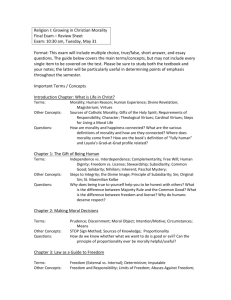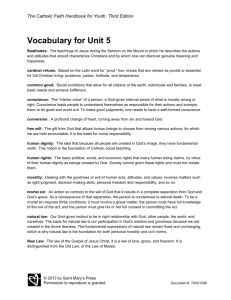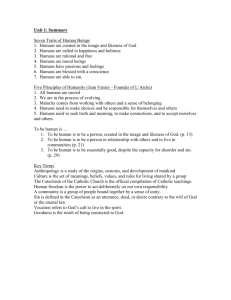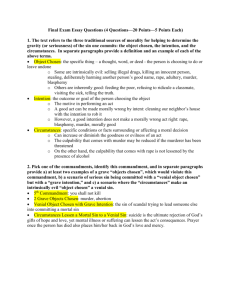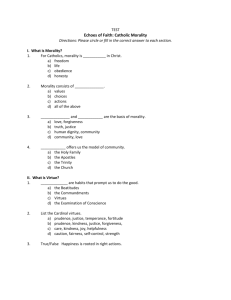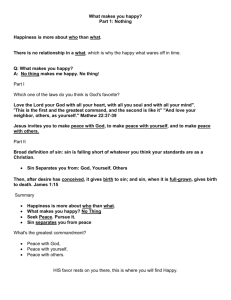Final Exam Notes
advertisement
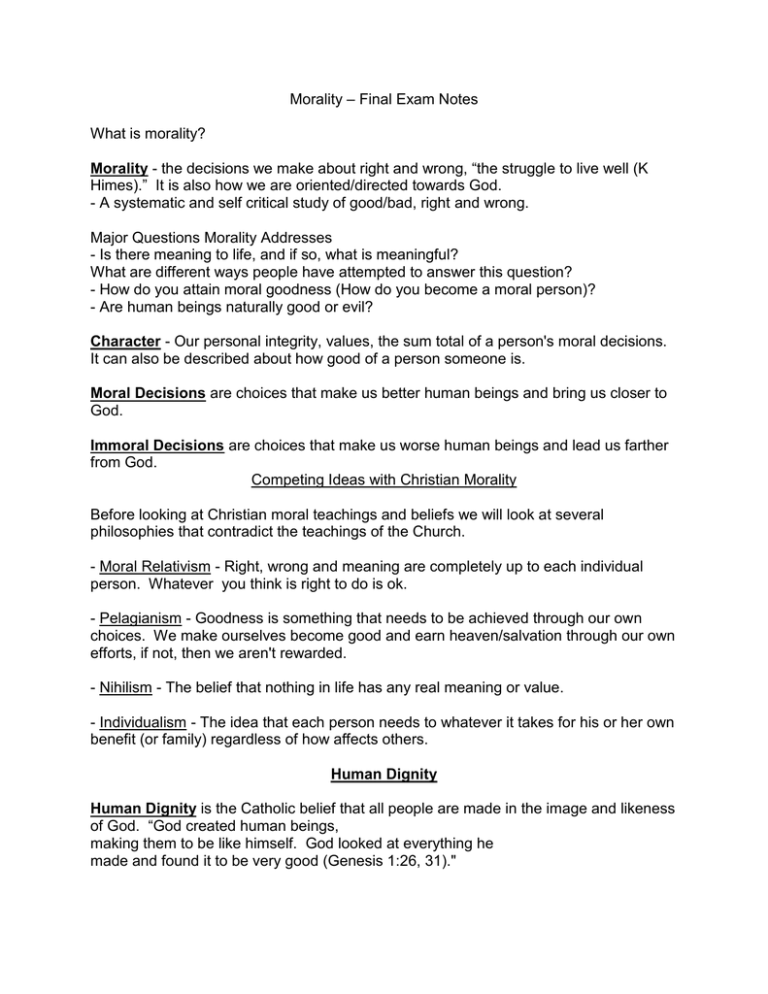
Morality – Final Exam Notes What is morality? Morality - the decisions we make about right and wrong, “the struggle to live well (K Himes).” It is also how we are oriented/directed towards God. - A systematic and self critical study of good/bad, right and wrong. Major Questions Morality Addresses - Is there meaning to life, and if so, what is meaningful? What are different ways people have attempted to answer this question? - How do you attain moral goodness (How do you become a moral person)? - Are human beings naturally good or evil? Character - Our personal integrity, values, the sum total of a person's moral decisions. It can also be described about how good of a person someone is. Moral Decisions are choices that make us better human beings and bring us closer to God. Immoral Decisions are choices that make us worse human beings and lead us farther from God. Competing Ideas with Christian Morality Before looking at Christian moral teachings and beliefs we will look at several philosophies that contradict the teachings of the Church. - Moral Relativism - Right, wrong and meaning are completely up to each individual person. Whatever you think is right to do is ok. - Pelagianism - Goodness is something that needs to be achieved through our own choices. We make ourselves become good and earn heaven/salvation through our own efforts, if not, then we aren't rewarded. - Nihilism - The belief that nothing in life has any real meaning or value. - Individualism - The idea that each person needs to whatever it takes for his or her own benefit (or family) regardless of how affects others. Human Dignity Human Dignity is the Catholic belief that all people are made in the image and likeness of God. “God created human beings, making them to be like himself. God looked at everything he made and found it to be very good (Genesis 1:26, 31)." Human nature - the way human beings have been naturally created. It’s based on their tendencies, attitudes and behavior. Catholics believe that human nature is good, although people have tendencies to go against their nature and make wrong choices. Christian Morality - Human Nature and Dignity Catholic Beliefs -Because all people are made to be like God, and God is both in and with each person, all people are sacred and valuable. -Every human life has meaning and is graced. - For Catholics, the best way to describe God is that he is perfectly loving. Therefore, God’s grace is freely given to us by God. - Human Dignity is not something that has to be earned by good behavior or that can be lost with sinful choices. 100%. or everyone the same, perfectly, - Human dignity involves seeing and treating all human beings as if they are in a sense part of a family or community. - Because we are all sacred and have dignity, the Church says that we all have certain human rights. 1) We have certain freedoms from 2) We have certain freedoms to do Sources of Morality What factors affect your morality and decision making? Internal Factors - Intuition - Your first reaction towards things, your "gut feeling." - Emotion - Your feelings and moods affect the way you make decisions - Conscience - Your ability to tell the difference between right and wrong. - Reason - using facts, logic and observations to support your moral reasoning. External Factors - Authority - Cultural Influences - Religious Beliefs The Creation Stories and the Incarnation This is the belief that God has chosen to become a human being instead or remaining in the form of God. In a sense this can be considered the greatest compliment to being a human, that God wanted to become one of us. The real origin of evil and sin is to reject the goodness of being human, that we are not really made in God’s image. It is to disagree with God’s statement about the goodness of creation and to think that nothing has any worth or is any good. The Incarnation is the revelation of the goodness of being human. According to Scripture, Catholics believe that Jesus became human like us in all things but sin. What truly unites us with God and makes us like him is to be a better human being. Anything that makes us truly a better person and makes us more authentically human also makes us more like God. Anything that causes us to turn away from the goodness of humanity or treat others as if they are undignified is an obstacle to relationship with God. Pope John Paul II even defined Christianity as “an attitude of deep amazement at the human person’s worth and dignity." Explicit Christians - People who believe and accept the teachings of Jesus and the Church. Implicit Christians - People who live out the teachings of Jesus in their lives. Categorical (Short Term) and Transcendental (Long Term) Conscience Conscience - Our ability to know the difference between right and wrong. Primacy of Conscience "The Divine Law is the supreme rule of actions; our thoughts, desires, words, acts, all that man is, is subject to the domain of the law of God; and this law is the rule of our conduct by means of our conscience. Hence it is never lawful to go against our conscience (Henry Newman)." - Our conscience is our personal ultimate moral authority. However, we have the responsibility to educate our conscience so it leads us to a right path. If our conscience is properly formed and used then we are obligated to follow it. - Our conscience should have the final word on what we should and should not do. Discussion - What are ways that a person can educate his or her conscience? Our conscience works in two different ways. Categorical (Short Term Conscience) - The everyday individual choices you make about right and wrong. - It's about how you live out your values. - How you choose to act in situations. - Choosing where you are in life now (Present). Examples: 1) Deciding to help out your younger sister with her homework when she is struggling. 2) Telling your friends to stop spreading rumors about another classmate. Both of these decisions are situations where you choose how to act in the present that demonstrate your values. Transcendental (Long Term Conscience) - Choosing the kind of person you want to be. - Choosing what your values are, the things that are most important to you. - Choosing where you want to be in your life (Future) - Big life decisions that take many little decisions to build up. Examples: 1) Deciding that you need to be a better friend by being more reliable. 2) Choosing to be more obedient by listening to your parents more often. In both cases, these choices involve big choices that take many little choices to build up. You don't all of a sudden become a more reliable person just because you help a person out one time; it takes many times before you are really becoming reliable. You aren't an obedient daughter or son just because you listen to your parents once or twice. This needs to become a habit where you are obedient many times before you truly have that value. Important Point: Both short term and long term decisions can be important and really change you as a person, not just long term decisions. Transcendental (Long Term) First With many of our choices we begin with the transcendental (long term) conscience first, where we figure out what kind of person we want to be, what we want to change to be like, or where we want to go in our lives. For example, if you decide to become a more faithful person (long term choice - picking a value) than what would be some short term choices you would need to make to become this? - Reading and reflecting on a Bible story - Going to Mass each week - Volunteering in a service project to help others Categorical (Short Term) Conscience First Many of our decisions begin with our short term conscience first before the long term. This is okay as long as we are paying attention to what the effects of these choices are and how they are changing us and our long term conscience. Reflecting on our categorical (short term) conscience choices can help us to recognize patterns and habits that we develop so we can see what kind of person we are becoming. Free Will and Sin - According to the Church, all humans have free will - the ability to make choices including about right and wrong (morality). - Original Sin - the belief that all people all born with the ability to commit sins. Although all people are naturally good and made in God's image we are not perfect and will have times where we choose against God (sin). - We have original sin because we have free will and can make choices. Free will also enables us to be good people because we can make right choices to follow God. - If we didn't have free will and were forced to be like God we wouldn't really be good because we wouldn't be choosing it. So its because we can have choices and can choose sin if we want also enables us to be good. Sin Sin is the free choice to hurt our relationship with God, ourselves and our community. Sin always negatively affects all 3 and goes against both truth and reason. - Sin is also a choice to disobey your conscience, to do the wrong thing when you know it's wrong or should have known better. - Sin can easily develop into a pattern of behavior or habit. The more you sin, the easier it is to keep sinning and it becomes very difficult to stop. Conditions for Evaluating Choices and Sin The moral goodness and seriousness of sin are based on three factors: 1) Action/Object - What you are actually doing and the effects it has on yourself and others. 2) Intent - Your motivation; the reason why you make a choice 3) Circumstance/Awareness - The secondary factors that affect an act like the time, place, method of the act and the conditions surrounding the decision. It also involves how much you know of the situation and the decision you are actually making, like if you are thinking clearly or if your thinking has been compromised. Different Kinds of Sin The Church teaches that not all sin has the same effects and consequences. Some sin is worse than others, but all sins are in a sense serious because of their affects and what they can lead to. - Venial Sin - Less serious sin that damages our relationship with God, ourselves and the community. - Mortal Sin - The most serious form of sin that completely breaks a person's relationship with God. In order for this to happen, the sin has to meet all three of the conditions of seriously bad action, intent, and full awareness of the situation. Virtues and Vices Virtues are good qualities that help us to become better human beings and grow closer to God. It is a firm attitude and disposition that guides us to do good. Vices are bad qualities that or habit that causes us to become worse human beings and be separated from God. Both virtues and vices are habits, which are patterns of behavior and ways of living. They often take time to develop. Influence - someone or something that changes the way we think or behave. Virtues The Church teaches that there are 7 virtues that truly stand out and grow closer to God. They are in two different categories. Theological Virtues - 3 most important The Church teaches that these 3 virtues are most important of all. They are faith, hope and love (charity). Faith - A person's relationship with God. Hope - Being able to see the good in others and in the world, not giving up in any situation, and knowing that God is with you through all things. Love (Charity) - Self gift, being able freely care for others without seeking anything in return. This is considered to be the most important virtue that all others build towards Cardinal Virtues - secondary virtues Secondary virtues that also help us to be better human beings. Wisdom (prudence) - Understanding, learning from experience, and being able to determine right from wrong in situations. Justice - Doing the right thing, fairness, helping people with needs. Courage (Fortitude) - The inner strength to face fears and challenges. Temperance - Having moderation and balance in life; also relates to self-discipline and not giving in to temptation. Capital Vices (Seven Deadly Sins) These negative qualities cause people to make immoral choices and distance themselves from God. They are seen to be the basis and cause of much sin. Pride - Having an excessively high opinion of oneself so that others are seen to be inferior and the person has no weakness or needs no help from others or even God. Jealousy (Envy) - The feeling of negativity shown orders because of something they possess or an accomplishment they have attained. It results in the inability to feel joy for the goodness of others. Greed - The strong desire to acquire more possessions and to keep things for oneself often causing a person to overvalue materials. Lust - Having strong sexual desires in a negative way that causes a person to treat others as if they are objects and not human beings. Gluttony - Doing something to excess so that it becomes unhealthy, often associated with food, drink, or substance usage. Anger (Wrath) - When a person's sense of displeasure or hostility cause them to be hurtful, often in seeking revenge. Laziness (Sloth) - The unwillingness to take care of a responsibility or participate in a good work because of the effort sacrifice involved. 2 Main Approaches to Christian Morality 1) Rules and Punishment Approach - Morality is about avoiding sin - “The first step on the road to right conduct is to avoid evil.” - Focuses on a person's actions and what people do. Conscience becomes less important. There are certain actions that we should stay away from completely. - We need rules and laws to guide us, the 10 commandments are very important. - Focuses on the 7 deadly sins. - Morality is about defining what is right and wrong in all situations. - Focuses on the idea of a Judgment Day to discourage people from sin (Judgment of Nations Matthew 25:31-46) - A person's heart or interior is the source of vice and sin (Mark 7:20-23) - We can become better people by avoiding sin. Actions can be categorized and labeled as being different kinds of sin. - You can change and reorder your interior to make it better and more loving if you form good habits and avoid bad habits. - Rules help to shape our habits. - Even if we only follow the rules for reasons that are not moral like just to stay out of trouble and we only do good things simply because we get some kind of reward, the idea is that if we do these things enough we will eventually transform our hearts to be more virtuous and will do good things for moral reasons. - Exceptions to rules can be dangerous. What kind of message does it send if you allow people to break a rule in certain situations? 2) Discipleship Approach Morality is about our response to God’s love. - Focuses on the intent, the reason behind the choice and not just the action -Looks to Scripture and Jesus' example for guidance. -Encourages the development of virtues. - Doing the right thing is its own reward and brings us happiness. - Jesus' New Commandment is what we need to follow instead of the Commandments (Matthew 22:40) - Looks to the Beatitudes as guidelines to help us find happiness and moral living. - A person's conscience is necessary in helping them to be a good person. - Sin is rooted in our failure to love, not necessarily our wrongdoing (bad actions) -"When pushed, most people are able to recognize their wrongdoing. We can easily recognize and label our sin when we cause harm by hurtful actions like lying, cheating, stealing and name calling. However we don't usually recognize our sin as when we fail to love others. In Scripture the one who sins is often blind to the sinning (K Himes)." - Good Samaritan (Luke 10:25-37) Jesus condemns the priest and levite not because they performed any hurtful action but because they did not care for or show love for the injured man. Sin is about not bothering to love. Letter of the Law - Following a law literally, the exact way its written. Spirit of the Law - Understanding the reason behind a law and the values or behavior it is trying to uphold. Forgiveness and Reconciliation Reconciliation - A sacrament of healing that helps a person to receive forgiveness from God. - Healing refers to spiritual healing - our relationship with God, but also healing can come in many forms including emotional, mental or sometimes physical. - God forgives people of all sins as long as we are open to ask for forgiveness and demonstrate a willingness to try and change. - Reconciliation is also called Confession and Penance, but these terms actually refer to two steps in the Sacrament. Steps of Reconciliation Reconciliation is not necessary in order to receive forgiveness from God 1) Examination of Conscience - The step of preparation before meeting with a priest where a person thinks about what sins they have committed and how he or she can become a better person. It's better to focus on one or a few significant sins instead of a long list of little things that may not be sins. 2) Confession - When a person actually meets with the priest and admits their sin. 3) Absolution - The acceptance of God's forgiveness. 4) Penance - Changing to become a better person after being forgiven so that the person does not commit the same sin again Conversion Notes 3 Ethical questions that go along with conversion: 1) Who are you? 2) Who do you want to be? 3) How to do you get there? - If we are unsure of who we are, our behavior will keep shifting with each identity we have. - “Conversus” - Latin word for to turn around towards something. What you turn to is your conversion. - Conversion makes no sense unless it is an enduring self. Your character is that which endures and lasts. People gradually change for the most part, patience is key for this. - Conversion isn’t one action, it is an orientation of one’s life that takes time to occur. - In order to undergo conversion, we must realize there is some inadequacy in the self. It’s a journey and awareness of not being what one ought to be. (Sloth=apathy, lacking passion towards anything and the good, goes against conversion) - A person who seeks conversion is truly free. He or she isn't predetermined and can change. - We tend to think of ourselves in light of how others treat us. During adolescence we question others’ identities of us. We start to pull away from our parents and relate to others to find our identities. - If culturally we take on identities just because the people around us have than we will eventually shed this identity. - An adult believer needs to experience one’s commitment to God as one’s own. You need to ask yourself the question, are you religious because you believe or because you grew up believing that? This isn't unique to religion and is true of any part of a person's identity as well. - Adults need a second conversion; they need a personal identity of who God is for them. - Moral conversion is a personal appropriation of values we want to live by. - 2 kinds of moral conversion: 1) Uncritical – movement from satisfaction to value. Satisfaction – you do what you do for a reward or to avoid pain. Conversion is when we move away from satisfaction towards caring for someone or a value we see. 2) Critical – movement from the values of others to one’s own values. Living out these values you believe in. This is very important for when we live in a pluralistic society where there are many different competing value systems. - Intellectual conversion is necessary for conversion, we construct reality for ourselves. - One of the tasks in living a moral life is to discipline our ego and to prioritize the well being of others. Objectivity and Subjectivity Objectivity (objective) – Objective means truth, the way the world really is. Certain things about the world are true always and all the time. - For example, when we stand in the sun it is hotter than standing in the shade. Human beings need to breath oxygen and if they don’t they will die. If someone I really care about says or does something mean to me it’s going to hurt in some way. (Catholic belief - If I have strong faith in God I am more likely to care for others and make moral choices.) All of these things are objective statements. They are statements of truth and fact. - Objective Information is observable, able to be sensed, factual, able to be counted, described or copied, the same according to multiple reports or sources, as close to the truth as we can get, helpful in decision making. Subjectivity (subjective) – This term means your point of view, the way that YOU see the truth and experience things in the world. Everyone is going to see and understand things a little bit differently because we are all different. Everyone also has influences that affect the way they see the truth. For example, if your best friend starts an argument with someone else that you don’t really like, and you know your friend is wrong, whose side are you more likely to take? Your best friend's probably, even if it is your best friend’s fault. - Subjective Information is opinion, judgment, assumption, belief, rumor, suspicion. It varies from person to person and day to day. It is not the truth and only a person's version of the truth. At times it can be misguided, completely false, and unhelpful in making decisions. Effect of Emotion Emotions can also be strong influences. For example, when you’re happy and you come home from school and your little brother starts to bother you because he wants you to play with him. How would you most likely react? You would probably tell him calmly to stop or you might even joke around with him. Now, what if you’re angry and your little brother does the same thing, what would you do then? You will probably yell at him or say something mean right back at him. In both cases we have the same objective truth, your little brother is doing something to annoy you. However there are two ways of looking at the truth; he is playfully annoying you to have fun as a joke or he is trying to make your life miserable and bother you. Subjectivity is how you personally interpret and view the situation. Morality and Objectivity - Subjectivity - Morality is rooted in objectivity. The Church teaches that God created us out of love in his image and likeness. We exist because God loves us, therefore our purpose since we are made in his image is to love others (objective). - Value in the world isn't created (think human dignity), rather it is something that we choose to appreciate or not. Something is or isn't morally valid simply because another person thinks it is ok, but rather what truly serves the well being and value of the other person. - - - - Church Teaching on the Moral Response to Refugees As American Catholics we have the moral responsibility to care for others especially those who are in greatest need such as refugees coming migrating to the United States. A refugee is “A person who owing to well-founded fear of being persecuted for reasons of race, religion, nationality, membership of a particular social group or political opinion, is outside the country of his or her nationality.” Refugees are not responsible for the conditions that cause them to leave their homeland. They are victims harsh circumstances and deserve justice and fair treatment. We have the obligation to love all humans as our neighbors. We should not limit our love to only to family members, friends, fellow citizens, or members of groups that we belong to.
